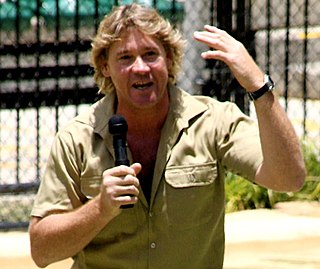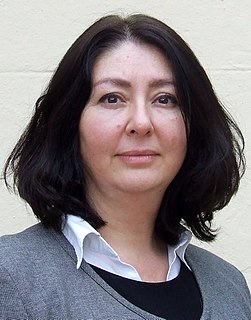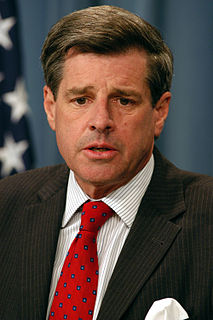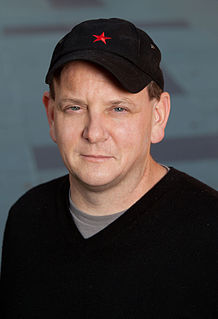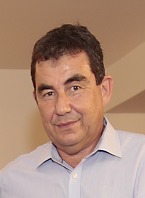Top 1200 Middle East Quotes & Sayings - Page 19
Explore popular Middle East quotes.
Last updated on April 22, 2025.
Some who call themselves realists question whether the spread of democracy in the Middle East should be any concern of ours. But the realists in this case have lost contact with a fundamental reality: America has always been less secure when freedom is in retreat; America is always more secure when freedom is on the march.
I kind of think that if you show conspiracy theorists a photo of the dead Bin Laden they will come up with an explanation for why it's really a Photoshopped picture of Bin Laden asleep. Or his dead cousin Fred. Donald Trump apparently believes that Bin Laden is dead, so that ought to be enough for the Middle East.
What bin Laden had hoped to achieve in Afghanistan in the post-9/11 period, which was to drag the United States into a protracted guerrilla war like the one he had fought against the Soviets, never happened. Instead, that protracted guerrilla war is now playing out in Iraq, in the heart of the Middle East.
American foreign policy is not understood by the vast majority of American people. And that this is due to a media that in this country is suppressed by Washington and by the owners of this media, who often tend to be corporate entities close to the [White House] and very often are arms manufacturers with a vested interest in chaos [in] the Middle East. And as a result Americans do not actually get both sides of the story.
Ending torture and tyranny in Iraq was not a mistake. Supporting democracy in Iraq is not a mistake. Helping the long-suffering Muslims of Iraq who now seek to live democratically is not a mistake. In the long, long history of the Middle East, this breakthrough may one day be ranked as a dramatic turning point in regional history.
The situation of women living in Islam-stricken
societies and under Islamic laws is the outrage
of the 21st century. Burqa-clad and veiled women
and girls, beheadings, stoning to death,
floggings, child sexual abuse in the name of
marriage and sexual apartheid are only the most
brutal and visible aspects of women's
rightlessness and third class citizen status in the Middle East
These terrible terrorism acts occur because of political situations and injustice in various parts of the world. The Middle East is heavy with injustice. After September 11,George W.Bush announced that he had always had a vision of a Palestinian state. Why didn't he tell us that before September 11, when it would have been a bit more impressive?
In my opinion, we've spent $4 trillion trying to topple various people [on the Middle East] that frankly, if they were there and if we could've spent that $4 trillion in the United States to fix our roads, our bridges, and all of the other problems; our airports and all of the other problems we've had, we would've been a lot better off.
I never felt totally, 100%, patriotically English... I'd seen a lot of the world by an early age - sort of spent a lot of time traveling around Lebanon and I'd seen Babylon, and Damascus, and all sorts of places in the Middle East by the time I was ten. Then we'd return to Ruslip in West London... Done a fair bit of traveling really.
At the same time, old confrontations have taken on frightening urgency, especially the India-Pakistan conflict over Kashmir and the violent stalemate in the Middle East. Progress on these and other global challenges requires us to develop a larger strategy for American foreign policy, rooted in a fundamental commitment to move the world from interdependence to an integrated global community committed to peace and prosperity, freedom and security.
Since the Bush-Cheney Administration took office in January 2001, controlling the major oil and natural gas fields of the world had been the primary, though undeclared, priority of US foreign policy... Not only the invasion of Iraq, but also the toppling of the Taliban in Afghanistan, had nothing to do with 'democracy,' and everything to do with pipeline control across Central Asia and the militarization of the Middle East.
What happens when I'm dealing with the problems in North Korea and the Middle East? Are you folks going to be reporting all that very, very confidential information, very important, very - you know, at the highest level? Are you going to be reporting about that, too? So I don't want classified information getting out into the public in a way that was almost a test.
The only person Henry Kissinger flattered more than President Richard Nixon was Mohammad Reza Pahlavi, the shah of Iran. In the early 1970s, the shah, sitting atop an enormous reserve of increasingly expensive oil and a key figure in Nixon and Kissinger's move into the Middle East, wanted to be dealt with as a serious person.
September 11 was a day of de-Enlightenment. Politics stood revealed as a veritable Walpurgis Night of the irrational. And such old, old stuff. The conflicts we now face or fear involve opposed geographical arenas, but also opposed centuries or even millennia. It is a landscape of ferocious anachronisms: nuclear jihad in the Indian subcontinent; the medieval agonism of Islam; the Bronze Age blunderings of the Middle East.
Much as Cold War nuclear strategists could argue about winning a nuclear war by having more survivors, advocates of a Global Warming War might see the United States, Western Europe, or Russia as better able to ride out climate disruption and manipulation than, say, China or the countries of the Middle East.
...if [the 9/11/01 attacks] had happened to the Russians, about three major cities in the Middle East would have been parking lots in twenty minute and they wouldn't have worried about the consequences because there would not have been any because the remaining terrorist states would have said 'we get the message.'
To be sure, many of the Sykes-Picot borders reflected deals cut in Europe rather than local demographic or historical realities. But that hardly makes the Middle East unique: Most borders around the world owe their legacy less to thoughtful design or popular choice than to some mixture of violence, ambition, geography, and chance.
I said in 2004,in fact a group was sent to me from the White House to try talk to me, because I was getting a lot of publicity.I said it in 2004, you're going to destabilize the Middle East, Iran is going to take over Iraq... and somebody else is going to help and that turned out to be ISIS. It's an exact.
In light of Trump's irresponsible behavior, even Putin may decide that it was time to recalculate Russian interests. This could happen quite quickly if Trump goes ahead and wrecks one of the few potentially stabilizing developments in the Middle East during the last several years. Similarly, if Israel joins NATO, this might be more than Putin is willing to swallow.
40 percent of people who come to visit America on a visa overstay their visa and we have no idea where they are. On 9/11, at least 2 of the hijackers were here on visa. They were traveling back and forth to the Middle East. And we really had no idea where they were or what they were doing. And they were overstaying their visa. So there are problems I think in the immigration system that need to be fixed for our safety.
We liked the idea that it was a low-tech future. But everything always repeats the past. If you look today and look at something in the middle east where you got people getting beheaded it's like the crusades with Twitter. It's crazy, human nature does the same thing. In a way, even though you're in the future people wanted order so this sort of system rose up.
But on the other hand, in discussion and debate concerning social issues or American foreign policy, Vietnam or the Middle East, for example, the issue is constantly raised, often with considerable venom. I've repeatedly been challenged on grounds of credentials, or asked, what special training do you have that entitles you to speak of these matters. The assumption is that people like me, who are outsiders from a professional viewpoint, are not entitled to speak on such things.
Sixty years of Western nations excusing and accommodating the lack of freedom in the Middle East did nothing to make us safe because in the long run stability cannot be purchased at the expense of liberty. ... The global wave of democracy has barely reached the Arab states. For too long, many people in that region have been victims and subjects. They deserve to be active citizens.
The left, led by the news media, has been telling us practically from the day that Donald Trump announced his candidacy that he would be a complete disaster, particularly in foreign affairs and foreign relations around the world, and even more particularly in the Middle East. And, instead, we see the rave reception that President Trump is getting everywhere he is going, the profound respect.
Anyone who has a simplistic idea about the Middle East, or about the conflict, doesn't get it - because there are no simple answers. And anyone who is messianic, in a right-wing way or a left-wing way, is wrong too. The way forward is a kind of cautious, commonsense approach - a cautious, humble hope. No fantasies.
We must formulate, with both imagination and restraint, a new approach to the Middle East - not pressing our case so hard that the Arabs feel their neutrality and nationalism are threatened ... while at the same time trying to hasten the inevitable Arab acceptance of the permanence of Israel ... We must ... seek a permanent settlement among Arabs and Israelis based not on an armed truce but on mutual self-interest.
We know that things like energy independence, getting off oil, getting out of the Middle East, and creating jobs and economic development in the new clean energy industries of the future are much higher priorities for most voters than capping carbon emissions or taxing dirty energy sources. So why not redefine our agenda as the solution to those problems?
For three years now, probably more, there is a clear common interest developed between Israel and the leading Sunni moderate entities. The Emirates, Saudi Arabia, Egypt, Jordan. And the common interest is to block radical Muslim terror, to counter the Iranian hegemonic and nuclear intentions, and to join hands in a huge infrastructure project from water, energy, transportation, whatever, in the whole Middle East.
Human beings everywhere in the world are affected by the global media now. Still, what I have noticed in the east Asia, in the indigenous world, Alaska in particular, and in back country farm and ranch country, is a higher sense of etiquette, and more respectful manners. Urban middle class cosmopolitan world peoples of all races have become speedy and rude. This is a pretty big generalization though.
There are definitely recurring themes in humanity's relationship with our environment. The biggest is probably adaptation, because humans are incredibly good at adapting to new environments in relatively short periods of time. The ancestors of Homo sapiens started leaving Africa over one million years ago, moving from warm, tropical climates into the freezing wilderness of Europe and the desert ecosystems of the Middle East.
Iraq's invasion of Kuwait is a case of bad men doing wrong things for wicked reasons. This is the full-sized or standard purebred evil and is easily recognized even by moral neophytes. Other malignities-drugs in America, famine in Africa and everything in the Middle East-are more complex. When combating those evils people sometimes have trouble deciding whom to shoot.
Israel's pro-American orientation exists not just among Israeli elites but also among the whole population. Come what may in Israel, it's inconceivable that this fundamental orientation will change. Combined with its overwhelming military power, this makes Israel a unique and irreplaceable American asset in the Middle East.
The violence stems from injustice, because people feel they have been treated unfairly in the Middle East, whether that means military occupation, starvation under U.N. sanctions, whether it means that they have a dictatorship imposed on them, propped up by the West. This is why people turn to violence, because they have no other avenue left.
As young West Point cadets, our motto was 'duty, honor, country.' But it was in the field, from the rice paddies of Southeast Asia to the sands of the Middle East, that I learned that motto's fullest meaning. There I saw gallant young Americans of every race, creed and background fight, and sometimes die, for 'duty, honor, and their country.'
Terrorists like bin Laden are serious about mass murder - and all of us must take their declared intentions seriously. They seek to impose a heartless system of totalitarian control throughout the Middle East, and arm themselves with weapons of mass murder. . . . Their aim is to seize power in Iraq, and use it as a safe haven to launch attacks against America and the world.
When Teddy Roosevelt was around, there was an Ottoman Empire. There was a Habsburg empire. They controlled millions of people across Africa, the Middle East and Europe. And they're gone.Prosperity killed them, because they didn't have a way to hold the people together. They didn't have the rituals and the holidays and the pride in their country. And that's what we need if we're going to hold ourselves together during periods of prosperity.
I don't think there's any difference in the two Donald Trumps. Maybe I didn't make this clear. I don't think Trump's different in Washington than he is there. The difference is you don't have anybody tweeting. The Trump in Washington compared to the Trump in Middle east trip, what's the difference? The Trump in Washington is filtered by the media.
Christians have ... identified their opponents, whether Jews, pagans, or heretics, with forces of evil, and so with Satan... Nor have things improved since. The blood-soaked history of persecution, torture, murder, and destruction perpetrated in the name of religion is difficult to grasp, let alohne summarize, from the slaughter of Christians to the Crusades to the Inquisitiion to the Reformation to the European witchcraze to colonialization to today's bitter coflict in the Middle East.
These people in media have a personal attachment to Barack Obama and his presidency and his legacy. And so Trump... It's just another of many reasons why Trump has to be diminished, destroyed, impugned, or what have you. But Middle East trip is so phenomenally successful, so phenomenally positive that they can't report it because it doesn't fit with the Trump whom they have painted in the last six or so months. But it's still getting out there.
As I searched the atlas for somewhere to run to, Hugh made a case for his old stomping grounds. His first suggestion was Beirut, where he went to nursery school. His family left there in the midsixties and moved to the Congo. After that, it was Ethiopia, and then Somalia, all fine places in his opinion. 'Let's save Africa and the Middle East for when I decide to quit living,' I said.
There's no telling what might have happened to our defense budget if Saddam Hussein hadn't invaded Kuwait that August and set everyone gearing up for World War II. Can we count on Saddam Hussein to come along every year and resolve our defense-policy debates? Given the history of the Middle East, it's possible.
I've just finished my 20th book this past year and I'm working on my 21st book about the Middle East right now that I'll finish this year. And I get up early in the morning and when I get tired of the computer and tired of doing research, I walk 20 steps out to my woodshop and I either build furniture or paint paintings. I'm an artist too.
I kind of think that if you show conspiracy theorists a photo of the dead Bin Laden they will come up with an explanation for why it's really a Photoshoped picture of Bin Laden asleep. Or his dead cousin Fred. Donald Trump apparently believes that Bin Laden is dead, so that ought to be enough for the Middle East.
The U.S. ultimately decides what the national security threat is. They put Russia one, Iran two, China three - the terrorists are down the list. But it's amazing to me that we can still consider Russia a threat. On the contrary, they've been very helpful in the Middle East, trying to calm the situation and respect the rights of sovereign countries to exist. It's the U.S. that hasn't - whether in Serbia, the old Yugoslavia, in Africa, and now, Iraq.


